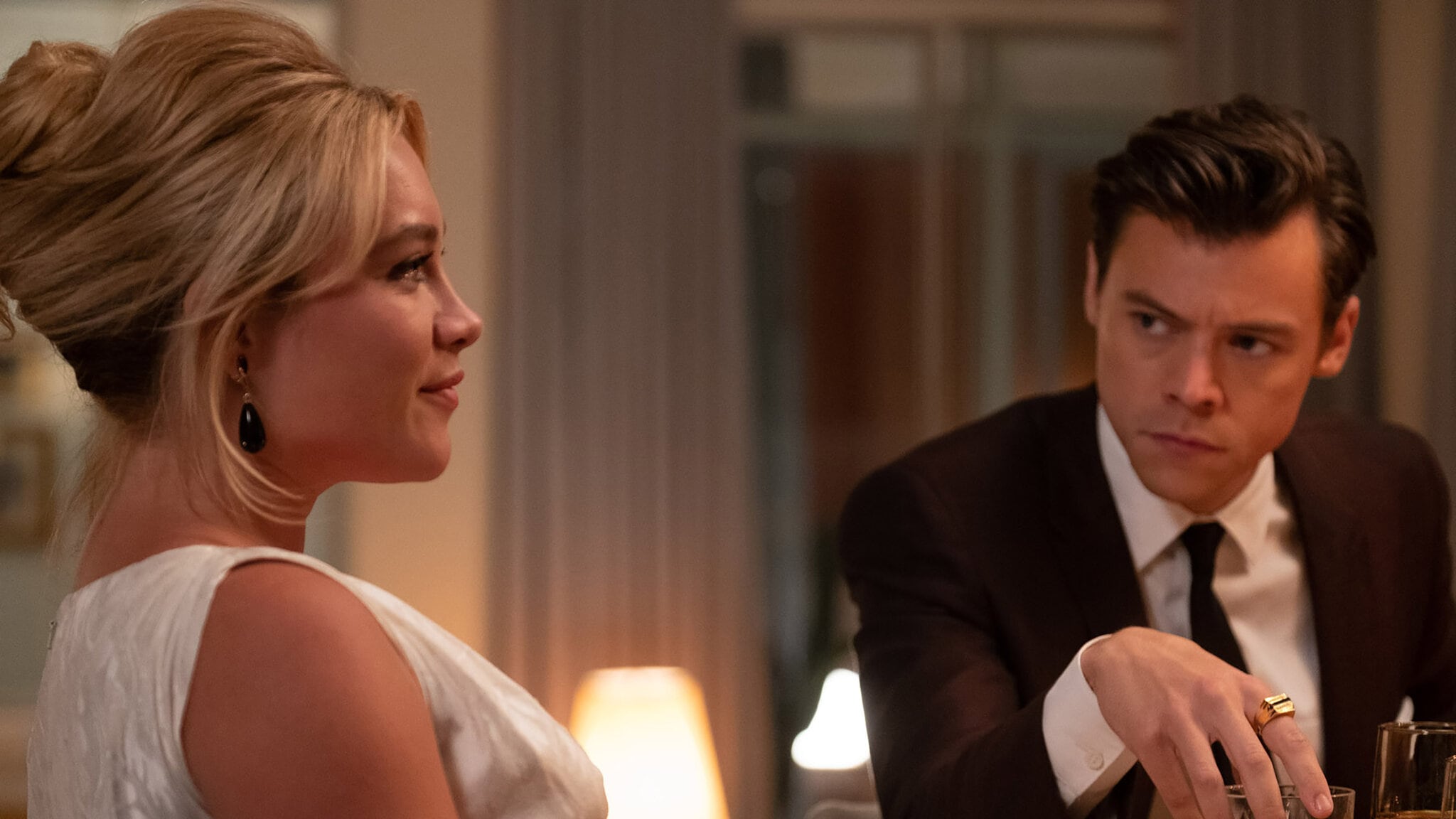DON’T WORRY DARLING
**** A woman walks through a desert in black, flat-soled shoes. Eventually, she comes to a massive white dome, presses her hands against one of its curved windows, and sees…what? That question haunts Don’t Worry Darling, a hallucinatory, sensual and delectably disturbing thriller from filmmaker (and tabloid fixation) Olivia Wilde. While Wilde’s directorial debut, Booksmart, affectionately lampooned a pair of liberal teens, Don’t Worry Darling satirizes a certain brand of fetishistic conservative nostalgia. Set in a 1950s suburban enclave dubiously named Victory, the film beckons you into the splintering psyche of Alice (Florence Pugh), a housewife who becomes justifiably paranoid after seeing a plane crash no one cares about and a slit throat no one will acknowledge. Her voraciously amorous husband, Jack (Harry Styles), wants her to believe that she’s delusional, but as a general rule, you should never trust a guy whose work is flimsily described as “the development of progressive materials.” While there is a rumor that the men of Victory are manufacturing weapons, Wilde lets us bask in the community’s sinister beauty before revealing the nauseating truth behind it. Like the Victory’s velvet-voiced leader Frank (Chris Pine), Don’t Worry Darling savors orderly imagery, but the climactic scene in which Alice drives a spotless silver 1953 Corvette as heedlessly as Mad Max suggests that Wilde understands both the allure of regression and the thrill of revolution. Had her movie been released in the 1950s, the poster could have read, “Glamour! Sex! Politics!” What more could you want? R. BENNETT CAMPBELL FERGUSON. Academy, Bagdad, Cedar Hills, Cinema 21, City Center, Eastport, Evergreen Parkway, Fox Tower, Laurelhurst, Living Room, Lloyd Center, Pioneer Place, St. Johns, Studio One, Tigard.
THE STORY OF FILM: A NEW GENERATION
**** In 2011, documentarian Mark Cousins set out to elucidate a little thing called film history. The Story of Film: An Odyssey lasted 15 hours, ran on Turner Classic Movies, and cemented former BBC host Cousins as a recognizable film appreciator. Now, the tastefully soft-spoken cineaste is back with a three-hour addendum—The Story of Film: A New Generation. This roving, languid video essay on 2010s cinema finds its strength in Cousins’ ability to unpack scene after scene—it’s part sermon, part clinic (imagine a David Attenborough film about movies). He strolls inquisitively through choice clips and categories, decelerating to the tempo of “slow cinema” like An Elephant Sitting Still, lovingly unpacking Booksmart’s comedic verve, and marveling inclusively at where VR and mo-cap are whisking cinema. While perhaps unnecessarily split into titles that Cousins views as extensions of historically great films and ones that are truly “new,” the documentary is always more commemorative than critical. It can sometimes be hard for cinephiles to trust other cinephiles during a movie testament this high-minded (skepticism and fandom often go hand in hand). But Cousins is always humble and affectionate enough to avoid excesses of snark, pretension or even genre bias. He’s just the shepherd through the latest chapter of a 120-year dream. May none of us ever wake. NR. CHANCE SOLEM-PFEIFER. On Demand.
PEARL
*** When the makers of the A24-bred, tastemaker-approved indie horror flick X announced they were readying an already filmed prequel for release, critics largely dismissed the claim as further evidence of just how much time everyone had to spare amid pandemic doldrums. You’d think that director Ti West (The Innkeepers, The Sacrament), who obsessively re-created ‘70s aesthetics for X, would be a poor fit for Pearl, a small-town character study set near the end of the First World War. Yet from the film’s overwrought orchestration to the Technicolor sheen of its opening credits, West seamlessly borrows the cinematographic palette from MGM’s glory days to brighten this old-fashioned yarn about a plucky farm girl’s dreams of silent-movie stardom. Co-screenwriter and star Mia Goth’s Baby Jane/Norma Desmond rictus grins and disarming naturalism make it hard to root against Pearl (even as the inevitable violent spree looms), and the playful but never jokey film draws strength from the persistent dread roused by our darkest fears: alligators, maggots, German accents and, yes, the unforeseen bloodlust of a fresh-faced psychotic. The scares are still big; it’s the pitchforks that got small. R. JAY HORTON. Cedar Hills, Cinemagic, City Center, Clackamas, Eastport Plaza, Evergreen Parkway, Laurelhurst, Living Room, Lloyd Center, Oak Grove, Pioneer Place, Studio One, Tigard.
BLONDE
** Late in Netflix’s mirthless Marilyn Monroe bio-fantasia Blonde, the starlet searches desperately for her wallet, trying to tip a delivery boy. It’s a standout glimpse of Norma Jeane as a simple, well-meaning person, with the lost wallet epitomizing everything she’s never had—control, normalcy, basic individuality. The rest of the nearly three-hour film is no less loaded with meaning, but is always more heightened (it was adapted from Joyce Carol Oates’ 2000 novel). Ana de Armas capably evokes Monroe, but authenticity is hardly Blonde’s north star. It’s a labyrinth of trauma-collapsed time, space and iconography. Monroe is sedated on a plane; no, it’s her movie premiere; no, it’s a forced abortion; wait, the movie camera belongs to the paparazzi. Director Andrew Dominik excels at creating haunted, surreal visuals, but he sometimes masks the sensitivity of de Armas’ performance. Worse, the script flails in hysterical biopic obligation when it comes to Monroe’s miscarriages, capital-D daddy issues, and childhood trauma. Unpleasant and unidimensional to the last, Blonde retains its power through imagery, an ode to our ceaseless consumption of a lost, largely invented woman. In this way, it is dour kin to Elvis (2022), another mythic ode to the obvious, as accusatory as revelatory. Oh, you haven’t had your fill of poor Marilyn? Load up on this. NC-17. CHANCE SOLEM-PFEIFER. Netflix.
